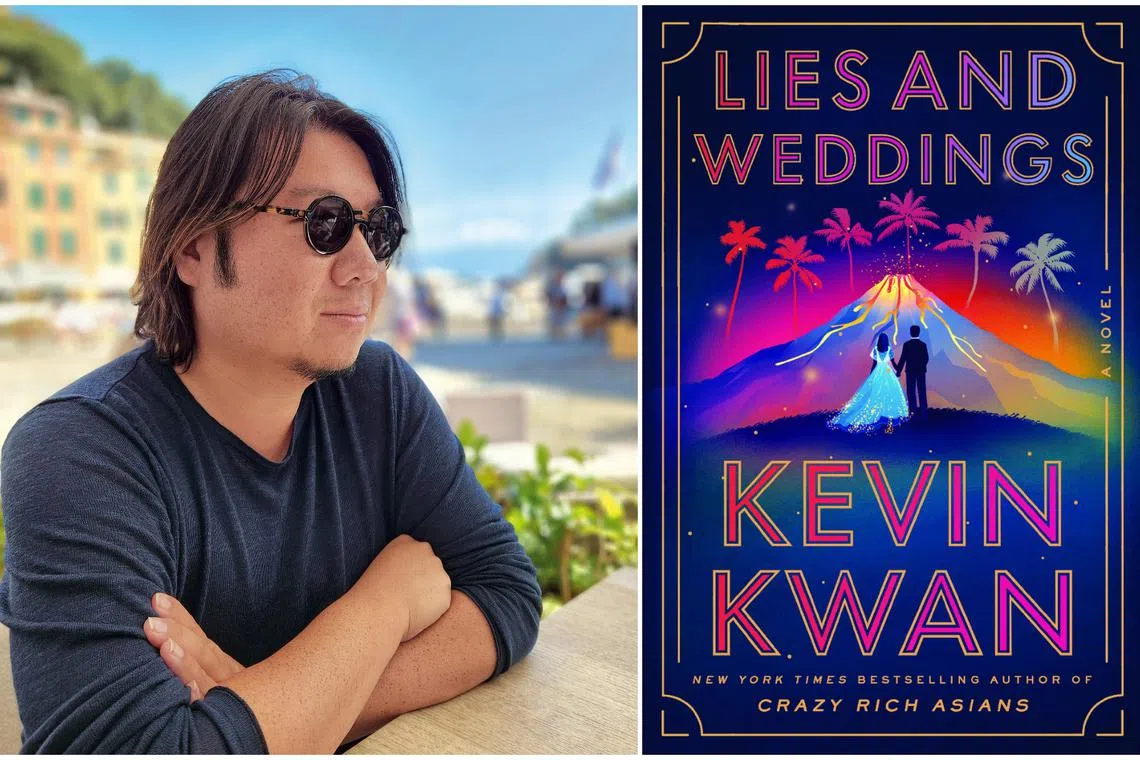Book review: Lies And Weddings by Kevin Kwan rehashes old schtick
Sign up now: Get ST's newsletters delivered to your inbox

Lies And Weddings by Kevin Kwan opens on the cusp of a spring wedding in Hawaii.
PHOTOS: COURTESY OF KEVIN KWAN, DOUBLEDAY
Clara Chow
Follow topic:
Lies And Weddings
By Kevin Kwan amzn.to/44Rm1qP
Fiction/Doubleday/Paperback/448 pages/$26.86/Amazon SG (
2 stars
It sometimes feels as if I am not the target audience for Kwan’s brand of chi-chi lit (read: “Chinese chick literature”), being neither in need of scoring a rich handsome husband nor able to fit into any number of comely Valentino dresses.
Then again, if the writing is evocative enough, it should make this matron at least feel young and frisky again.
Alas, this book does not.
I read Kwan’s Crazy Rich Asians when it was first published a decade ago, when it had been somewhat of a literary sensation.
Back then, the idea of a mass-market title featuring a huge cast of monied Asian relatives felt subversive: an upending of power structures along racial lines, and a long-overdue acknowledgement of the new world order involving Asia’s affluence and soft power.
Ten years and one hit movie adaptation on, the concept of ridiculously wealthy, globetrotting Asians swanning around in romance plots involving connections and family offices has waned considerably in novelty.
In Kwan’s latest, the eligible bachelor is Rufus Leung Gresham, future Earl of Greshamsbury, who is of English-Chinese descent.
The book opens on the cusp of a spring wedding in Hawaii: that of Rufus’ sister Augusta to a Prince Maximillian zu Liechtenburg.
Meanwhile, mother of the bride – the Hong Kong-born former model married into English aristocracy, Arabella Leung – is not resting on her laurels after finding a suitable match for her eldest offspring. Instead, she is shifting into overdrive to marry her only son off to a French hotel heiress, so as to solidify her own business and social position.
Never mind that Rufus, an artist who surfs and rigs up his own outdoor moonlight showers, is interested in someone else. Very interested.
Hijinks ensue.
The plot feels like a mishmash of Jane Austen, American comedy-drama series Desperate Housewives (2004 to 2012) and British romantic comedy Four Weddings And A Funeral (1994), sprinkled with Cantonese swearing.
In place of Austen’s wry, ironic authorial wit, there is an unnamed commentator who pops up in footnotes to elucidate the reader on, say, the British peerage system; or (intrusively and needlessly) the price of vintage designer furniture.
Whole paragraphs are clogged with dense references to fashion houses and brand names (Kwan attended Parsons School of Design in New York City and used to work for magazines such as Interview and Martha Stewart Living).
After a while, it becomes rather tedious. Is that the point?
Constant name-dropping is as satisfying in prose as cornflakes are in nutrition. And descriptions of one impeccably catered party in a breathtaking locale after another can start to grate.
All this partying also takes its toll on character development. The male protagonist Rufus, apart from being gorgeous, ripped and surprisingly down-to-earth for a rich person, does not seem to have much else to commend him to the reader.
Even the good guys in the novel can sometimes come across as gold-diggers, hangers-on and naive spongers. And instead of a gentle progression between Rufus and his love interest, the union seems to have been written in the stars – leaving little doubt as to where the plot is going.
Understandably, the genre assumes and even requires stock types, but to not build in concrete action and sustained scenes is to risk leaving the reader mystified and cold.
Still, there are some classic crowd-pleasing touches here, like the hotel-buying scene that has become so iconic in both the Crazy Rich Asians book and film.
Racists often get their a**es kicked to the metaphorical – and literal – kerb. As the Los Angeles-based son of a Filipino-Chinese tycoon puts it in the book: “I think I own the sidewalks all the way to Highland.”
The revenge fantasy here takes the form of beating the oppressors at their own game and showing them who is the corporate boss. Yet, behind all that is an acquiescing to the status quo.
Power systems – prosperity, beauty and prestigious education – are merely reversed and repeated, instead of meaningfully questioned and dismantled.
The gatekeepers have changed, but the gates are firmly in place. And in 2024, it all just seems so… well, 2014.
If you like this, read: Last Of Her Name by Mimi Lok (Kaya Press, 2019, $26.53, Amazon SG, go to amzn.to/3WHgBfW
This article contains affiliate links. If you buy through these links, we may earn a small commission.

